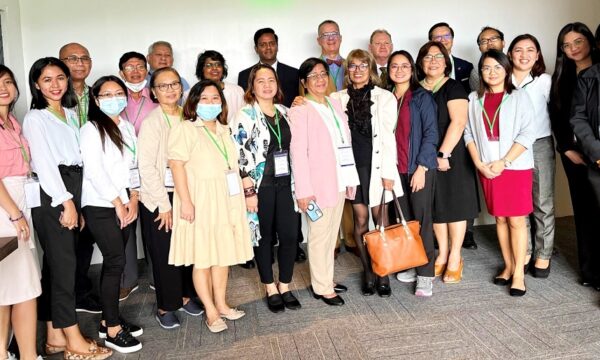
A key milestone has been reached in ongoing efforts to enhance the regulatory harmonization of pesticides to help fight crop pests and diseases as part of an Integrated Pest Management approach to ensuring greater food safety and security.
The United States Department of Agriculture (USDA) and CABI, with the support of the Fertilizer and Pesticides Authority (FPA) of the Philippines, held specialized technical training workshops in Manila to explore recent concepts in residues and bio-efficacy assessments for pesticides registration.
Agriculture employs 24% of the Filipino workforce and the industry accounts for 8.9% of the Gross Domestic Product of the Philippines. But pesticides are widely used by farmers to protect crops – such as vegetables, banana, and rice – from crop pests and diseases. The three most common types of insecticides are organophosphates, carbamates and pyrethoids.
Safety and efficacy of agricultural products in the region
By bringing together experts from diverse backgrounds, the workshops allowed for the exchange of knowledge and cross-cultural learning – enhancing not only technical skills but also promoting a unified regulatory framework to ensure the safety and efficacy of such agricultural products in the region.
The workshops, which were conducted on “Assessment of Pesticides Residue Studies” and “Assessment of Bio-efficacy Studies” were attended by 57 regulatory officials representing FPA, the Bureau of Agriculture and Fisheries Standards (BAFS) and the Bureau of Plant Industry (BPI) in the Philippines.
Attendees also gained in-depth knowledge and practical skills, enabling them to evaluate dossiers and make informed decisions based on available data.
Facilitate making the existing regulatory system more efficient
The workshops were held after similar consultative meetings were held with FPA throughout July and September 2023 organized by USDA and CABI in partnership with CropLife Asia. These meetings played a crucial role in identifying priority areas and topics which can facilitate making the existing regulatory system more efficient.
Earlier in March 2023, USDA and CABI solidified their commitment to support bilateral trade with Association of Southeast Asian Nations (ASEAN) member countries and eliminate unnecessary trade barriers related to maximum residue limits (MRLs) of pesticides.

This endeavour aimed at strengthening and harmonizing pesticides registration systems across ASEAN member countries, with a particular focus on the Philippines. This collaboration has been extended to the FPA, where joint efforts are being sought to elevate regulatory capacities under a bilateral workstream.
The successful execution of these training workshops signifies a key milestone in ongoing efforts to enhance regulatory capacities in the Philippines. The knowledge acquired by participating officials is expected to contribute to more effective and science-based decision-making in the assessment of residue and bio-efficacy studies.
Importance of collaborative efforts in achieving shared goals
At the workshops, Michelle Flavin, International Programs Specialist at USDA Foreign Agricultural Service (FAS) and Dr Sabyan Faris Honey, Deputy Director Business Development from CABI, welcomed participants and emphasized the importance of collaborative efforts in achieving shared goals. A key objective of the workshops was to bring in international expertise and share insights with in-country scientists and regulators.
Recognizing the lasting impact of these workshops, Ms Julieta B. Lansangan, the OIC Executive Director of FPA, expressed gratitude for the support provided by USDA, CABI, and CropLife Asia. She highlighted FPA’s commitment to improving its existing system, making it more efficient and harmonized with the global community.
Mark Hanzel, Agricultural Attaché of USDA-FAS, assured full USDA support to facilitate regional trade through harmonized, science-based policies in the Philippines and across ASEAN member countries. Emphasizing the collaborative spirit as a model for addressing complex challenges in agricultural regulation, Mr Hanzel stressed these efforts would uphold high standards in ensuring the safety, efficacy, and sustainability of agricultural practices in years to come.
Through dialogue, knowledge exchange, and joint initiatives, USDA, CABI, and FPA are paving the way towards a more sustainable and harmonious agricultural future in the ASEAN member countries.

Additional information
Main image: Specialized technical training workshops in Manila were held to explore recent concepts in residues and bio-efficacy assessments for pesticides registration.
Authors
Dr Sabyan Faris Honey – Project Manager
Saqib Ali – Communication Officer
For more information, please contact:
Michelle Flavin USDA – FAS (michelle.flavin@usda.gov)
Related News & Blogs
Joint efforts towards strengthening harmonization in the pesticide regulatory landscape of the Philippines
CABI together with the United States Department of Agriculture (USDA) and the Fertilizer and Pesticide Authority (FPA) of the Philippines have produced working manuals to help strengthen harmonization of the pesticide landscape in the Philippines. The…
23 May 2025




